Month: July 2024
IcARUS Policy brief: Fostering Community Involvement in Safe Public Spaces
Safeguarding urban public spaces and managing them in ways that promote safety, inclusivity and accessibility remains one of the top priorities of local and regional authorities, and a key mandate from the public. Urban public spaces are central to the attractiveness and quality of life of cities. They are vital to urban life and wellbeing: places for communication, gatherings, political demonstrations, artistic and cultural performances and all sorts of entertainment.1 They are places where people come together and interact with other people from all backgrounds and walks of life.
Yet the quality and sustainability of public spaces face a range of threats, and ensuring that they remain safe, inclusive and open to all is a complex challenge.2 As the level of governance closest to citizens, local and regional authorities are best placed to understand their concerns in relation to safe and open public spaces and implement appropriate measures to reduce feelings of insecurity.

FINAL COUNTDOWN FOR THE IcARUS PROJECT
The 8THcoordination meeting, followed by the final conference: “Innovative Approaches to Urban Security: Strengthening Crime Prevention Through Social Innovation” were successfully conducted on the 25th and 26th June 2024 in Liège (Belgium). Simultaneously, the Efus’ General Assembly also took place on the same date and place. The events were kindly hosted at the premises of Liege City Hall, also known as La Violette, an impressive architectural jewel, built in 1714 and listed as an ’exceptional heritage’ of Wallonia since 2002.
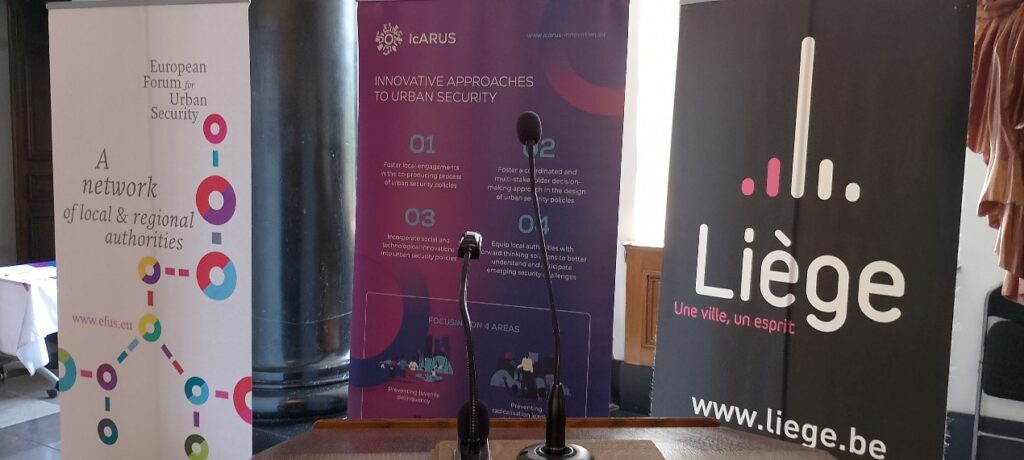
During the coordination meeting, the main outputs of the project were presented to all partners, but also concrete ideas on the sustainability of its developments and results, such as the Innovation Studio, were highlighted. This studio would work as a lab, divided in 6 areas of action: define and understand the issues, draw inspiration, co-produce local security strategy, testing a pilot and implementing a solution, evaluation-knowledge management, sustainability-transferability.
The finalpending activities of the project are expected to be concluded before its finalization, on the 31st August 2024.
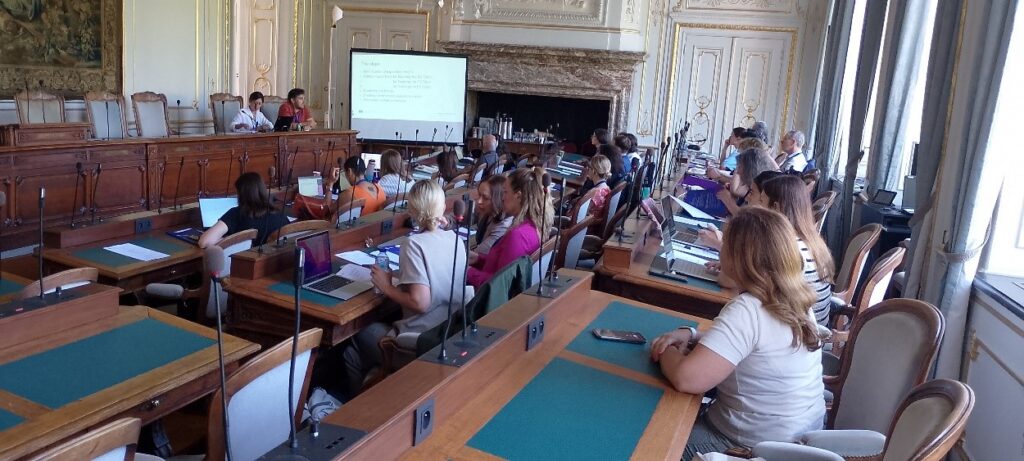
As for the subsequent Conference, six panels composed the agenda, gathering representatives from different Cities’ Councils as well as experts from several EU countries and wide fields of expertise, from the practitioners’ level to the researchers, academics and other affiliations. Having as a starting point of the discussions the tools created by the 6 cities within the framework of the IcARUS project, very important presentations and interactions took place, focusing on the following topic areas: Innovations inPolicing Tactics and Anti-Harassment Initiatives based on information provided by citizens, Unveiling the Power of Social Innovation in Urban Security, Preventing Radicalization Leading to Violent Extremism: Arts and Culture at the helm of Innovation, Building Resilient Communities: Fighting Organized Crime and Fostering Social Cohesion, Community-Led Solutions: Fostering Young People’s Engagement and Collaboration in Preventing Juvenile Delinquency, Evaluating Urban Security Initiatives: Exploring Challenges and Opportunities.
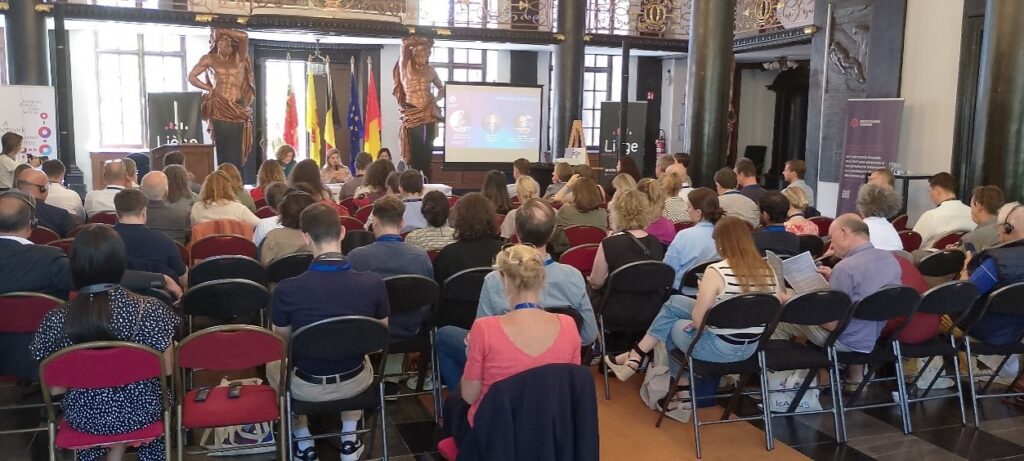
Among the many interesting opinions expressed, the phrase “choose your battles”, on the kinds of criminal activities that stakeholders could fight was a shocking yet realistic suggestion, since not all forms of crime could be simultaneously addressed.
Moreover, the important need for consideration of the “balloon effect” on the possibility of transfer of criminal activities to other areas has been a not to be omitted point for every decision maker. As many recommendations for the cities to respond and prevent crime, were put on the table, these could be summarized on the need for monitoring, scheduling the objectives to achieve and the design of a broader-scale plan on the intervention.
What an exciting, deep learning and innovative journey it has been!
The future of IcARUS is about to begin!

Participatory Artificial Intelligence and Local Governments
Artificial intelligence (AI) is transforming many industries, and public administration is no exception. Last Month (May 2024), Prof. Daniel Gatica-Perez took part in the 12th edition of eGovernment Symposium Romand on the theme of public administrations and Artificial Intelligence held at the Swiss Digital Center in Sierre in the canton of Valais in Switzerland. It brought together representatives from business, government, academia, and politics to discuss the opportunities and limitations of AI in administration. The symposium provided a platform for collaboration and knowledge exchange between various stakeholders.
Prof. Daniel Gatica-Perez from Idiap showcased the collaborative tools from [Idiap’s] (https://www.idiap.ch/en) [Centre for Participatory AI] (https://www.idiap.ch/en/scientific-research/center-for-participatory-ai). In particular, he talked about Participatory and equitable AI and the human values involved in designing, developing and deploying socio-technical systems. He presented the [IcARUS project] (https://www.icarus-innovation.eu) as a case study. Talking about the IcARUS project, he mentioned gathering of 17 partners and drawing together the best evidence from urban security research and practice from the last 30 years to implement an evidence-based, integrated, multi-stakeholder approach to urban security problems.
Discussing the questions of “What human forces should be amplified?” and “How to support the public in the loop?” he presented the “EIPG: Evidence-Informed Participatory Governance” model developed in the IcARUS project and its implementation through the tool created for the cities of Turin and Riga, namely Sbocciamo Torino and Par drošu Rīgu!
Lastly, he discussed the case study of “Generative AI and local governments” providing examples of existing tools in cities, Idiap’s Centre for Participatory AI, and the EU AI Act. He concluded the talk with a presentation of the 12 defining competencies of Generative AI literacy which was also developed in the IcARUS project.

Stanislavs Šeiko visits Community Policing Department of Salzburg and Master Program Social Inno-vation, Salzburg University of Applied Sciences (FHS)
On Tuesday 21 May 2024 the team of Salzburg University of Applied Sciences (FHS) had the pleasure to welcome the IcARUS colleague Stanislavs Šeiko, Head of Strategic Planning of Riga Municipal Police. He is responsible for the Riga police contributions of IcARUS and the elaboration of the innovative intervention “Par drošu Rīgu” (For safe Riga).
During the morning Stan Šeiko and Heiko Berner from FHS visited “the other Salzburg”: several social service providers which are active in one of the less wealthy parts of the city.
Later the same day Stan and Heiko had the opportunity to exchange with the community policing department of Salzburg “Gemeinsam.Sicher”. The colleagues from the municipal police – namely Christoph Kraler-Bergmann – invited them to visit their head quarter and presented the concept of community policing in Salzburg. They were quite interested in the Riga situation and the answer that the intervention “Par drošu Rīgu” (For safe Riga), elaborated in IcARUS, offers.
Finally, Stan presented the IcARUS tool to the students and professors of the master program “Social Innovation” of Salzburg University of Applied Sciences – a contribution that was highly appreciated from the Salzburg team.
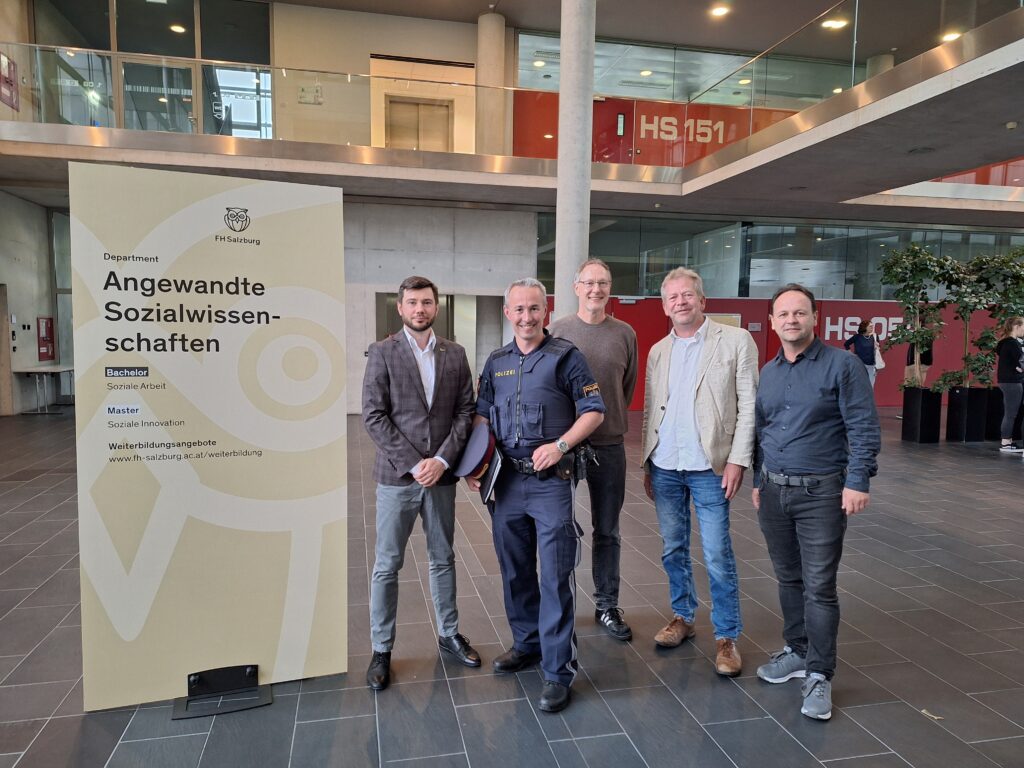
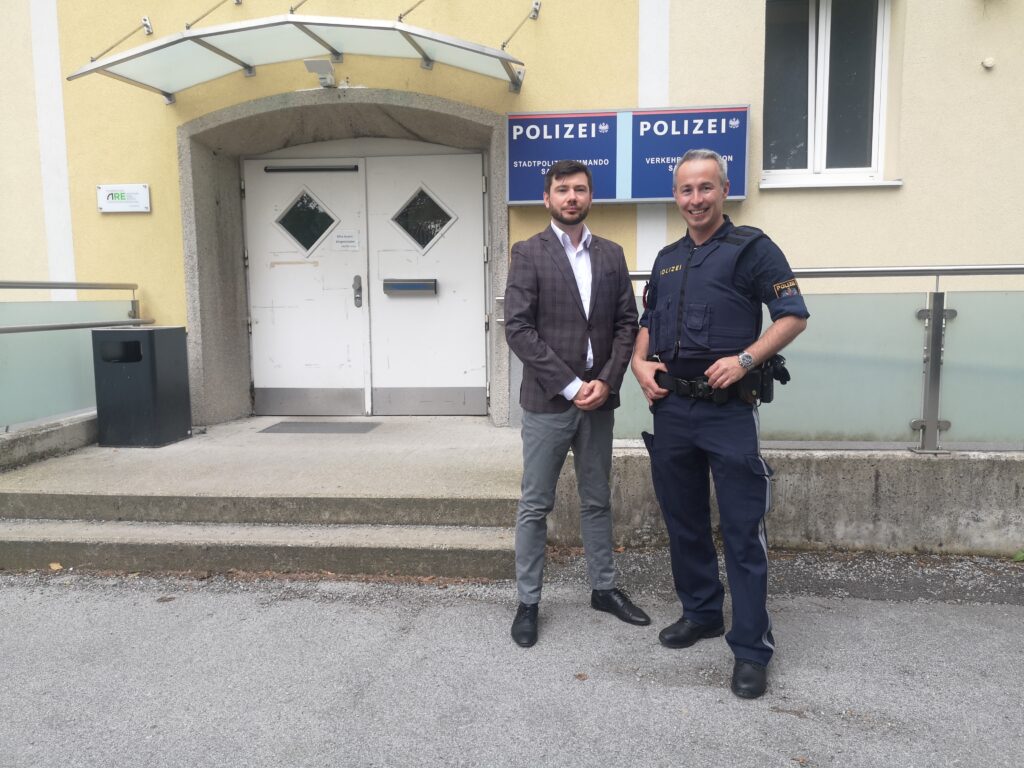

subscribe to be the first to receive icarus news!
Know what we've been up to and the latest on the European urban security frame.









